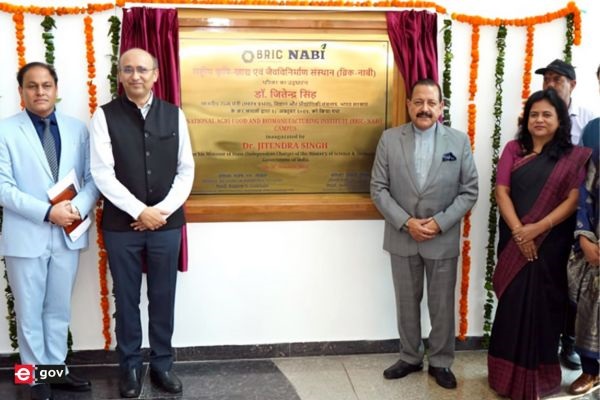Union Minister of State for Science and Technology, Dr. Jitendra Singh, inaugurated the country’s first biomanufacturing institute, BRIC-National Agri-Food Bio-Manufacturing Institute (BRIC-NABI), to revolutionize India’s agricultural and food sectors through cutting-edge biotechnology. This initiative aligns with PM Modi’s vision of a “Viksit Bharat” (developed India), aiming to modernize agriculture, foster economic growth, and promote sustainable practices.
At the opening ceremony, attended by scientists, industry leaders, and stakeholders, Dr. Singh emphasized the government’s commitment to innovation in agriculture as a means to create jobs and support environmental goals. He noted that BRIC-NABI would play a pivotal role in transforming India’s agriculture by advancing biotechnological solutions that are both sustainable and scalable. The minister underscored biotechnology as a key component of the Modi government’s BioE3 policy, which integrates economic growth, employment generation, and environmental sustainability.
“This institute will enable India to transition from traditional manufacturing to cutting-edge synthetic production, utilizing advanced, eco-friendly technologies to meet global challenges,” Dr. Singh said, adding that India’s recent economic achievements reflect the government’s science-driven approach.
BRIC-NABI was formed through a strategic merger between the National Agri-Food Biotechnology Institute (NABI) and the Center of Innovative and Applied Bioprocessing (CIAB), creating a unique platform to bring research to market. The institute will focus on developing high-yield, disease-resistant crops, as well as biofertilizers and biopesticides—critical advancements aligned with the government’s mission to double farmers’ incomes and advance sustainable farming.
A major feature of the new institute is the BioNest Incubation Centre, designed to support startups and young entrepreneurs in the agriculture, food, and bioprocessing sectors. The center aims to provide resources for startups to collaborate with industry, helping new businesses bring innovative agri-food products to market. Dr. Singh emphasized that BioNest aligns with the broader “Make in India” mission, encouraging self-reliance and boosting job opportunities for India’s youth.
Looking to the future, Dr. Singh announced the upcoming Biomanufacturing Workshop 1.0, set for December 2024, which will showcase applications of biomanufacturing in agriculture, pharmaceuticals, food, and energy sectors. The workshop, designed for researchers and industry professionals, aims to strengthen the implementation of the BioE3 policy and promote sustainable innovation across India.
In his concluding remarks, Dr. Singh addressed India’s ongoing “brain drain” and encouraged young researchers to pursue their scientific careers within India, underscoring the country’s evolving research ecosystem and its competitive stance in the global science community.
With BRIC-NABI’s inauguration, India marks a significant advancement toward establishing itself as a leader in science, innovation, and sustainable growth, paving the way for a vibrant, biomanufacturing-powered economy.


